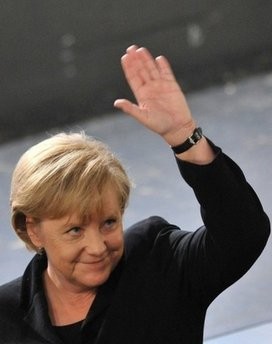A fractious European Union summit looms this week as the bloc heads for a hard hurdle -- a fresh and risky rewrite of its treaty demanded by France and Germany to shore up the euro.
Leaders of the 27-nation bloc face the challenge at a two-day summit starting Thursday to turn the lessons of the 2008-2009 economic crisis into hard and fast rules tightening debt and deficit discipline.
But a controversial Franco-German proposal issued days ago, denounced by many as a "diktat", calls for the rules to be enshrined in a new draft of the hard-fought Lisbon treaty, which came into force only last December after eight years of tough talks and failed referenda.
"This is an extremely sensitive isssue that frightens the life out of some nations," said a senior EU diplomat. "It'll be the hot theme of the summit."

The notion of rewriting the fledgling treaty surfaced last week when French President Nicolas Sarkozy and German Chancellor Angela Merkel plastered over their own differences over economic governance in a sudden deal.
In efforts triggered by the emergency rescue of Greece and fears of a cascade of national basket-cases, EU leaders had this year created a 440-billion-euro rescue fund -- the European Financial Stability Facility (EFSF) -- set to expire in 2013.
Germany, which has been the biggest contributor to EU rescue efforts, favoured a temporary fund to ensure reining in spendthrift nations.
But Merkel last week caved in to Sarkozy's call for the facility to be made permanent to shore up Europe's monetary union, which dates back to 1999.
To meet the requirements of the German constitution, however, giving the EFSF eternal life requires a change to the Lisbon treaty, which currently outlaws EU member states from flying to the rescue of a bankrupt eurozone partner.
"The summit will have to indicate how to create a credible mechanism, given concerns in Germany, which refuses to extend it unconditionally," the diplomat said.
Sarkozy for his part obtained a softening of already tentatively agreed sanctions against deficit offenders, which were supposed to be automatic but now would be more flexible while biting sooner.
The deal has raised hackles across the bloc of half a billion people.
"We're not happy with what the French and the Germans did," European Parliament spokesman for economic affairs John Schranz told AFP as lawmakers too prepared to mull the new rules this week.
"We want sanctions to be heavy-hitting and automatic" as opposed to the watered-down vision agreed by Sarkozy and Merkel, he said.
The sanctions climbdown has already been the subject of stern criticism from the head of the European Central Bank, the formal guardian of euro stability.
Budgetary hawks also including the Netherlands, Sweden and Finland do not think the proposed new rules go far enough.
Some in Berlin accuse Merkel of buckling, but others accuse EU finance ministers as a whole of getting "cold feet".
"It is a step backwards," said Austrian conservative Othmar Karas.
Worries are high too of opening a new Pandora's Box in rewriting the Lisbon treaty, though some officials say the new rules could be simply written in when Croatia becomes the EU's 28th member -- which it hopes will be in 2012.
But other members could pile up new demands in exchange for green-lighting the Franco-German accord.
Non-euro Britain for example could come armed with a shopping list, even if senior EU officials insist sanctions will only apply to nations using the single currency.
British Prime Minister David Cameron "will not support anything that involves a transfer of powers from Westminster to Brussels," a government spokesman said.
While Britain ratified Lisbon without a referendum, Cameron is already planning to bring forward legislation that would make any further dilution of "sovereignty" an issue requiring popular assent.







)
















